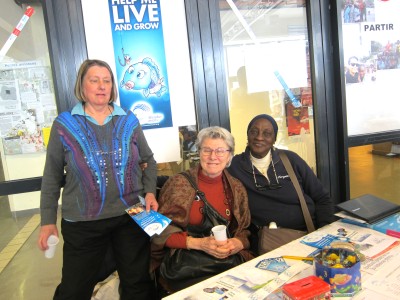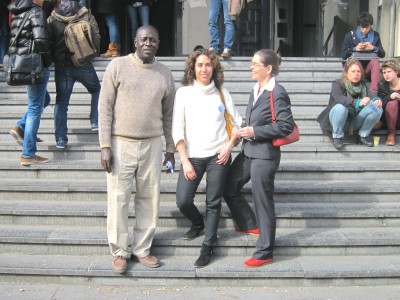
For the 12th consecutive year, the universities of the Federation Wallonia-Brussels and the Flemish universities (UA, UGent) will mobilise during the month of March 2014 in order to make the university community more aware of North / South relations and the challenges of development.
This year's theme is 'Land'. This theme can be approached from many different angles (the right of access to land, the problem of land degradation, land grabbing, but of course, as well the relationship between the land and the sea... ).
At the Free University of Brussels (ULB), Campus Plein Sud will take place from March 10 to 21. During these two weeks, various activities / events will be organised. The goal is to revive the interest of members of the university community (academics, students, researchers, ...) for the problems of North-South relations.
Mundus maris contributes, as usual, with several events:
- Lunch debate with important personalities on " The international dimension of the implementation of the reform of the European Common Fisheries Policy, Tuesday, 18 March, from 13 to 14h at the Institute of Sociology, Baugniet Room, Solbosch Campus, Av. Jeanne 44, 1050 Brussels - in collaboration with the Vice-Rector for International Relations of the ULB and SEDIF. Click here for the announcement and find information about the event on our FaceBook page.
- NGO Forum, Wednesday, 19 March, from 11:00 to 15:00 in the Foyer Culturel of the Solbosch Campus of ULB.
- Open Course, Wednesday, 19 March, from 16:00 to 18:00 in the course "Biology and Society" of Prof. Ariane Ramaekers. Title: "Land and Sea. Which objectives for sustainable development from the local to global levels?" Venue: UB2.252A Campus du Solbosch, bâtiment U, porte B, niveau 2, local 252A (Lameere).
The NGO Forum
 The NGO Forum took place again in the Foyer Culturel of the Solbosch Campus of ULB, this time on more restricted space than last year.
The NGO Forum took place again in the Foyer Culturel of the Solbosch Campus of ULB, this time on more restricted space than last year.
Most importantly, the atmosphere was excellent among NGOs present and the many students and staff that passed through the Forum space for a look and a chat.
Students from quite different backgrounds felt attracted to engage in a conversation and learn more about the oceans and the need to protect them more effectively. As overfishing was still rampant, starting to let the baby fish grow to mature, reproductive size, seems to be a logical first step. 80% of cod caught in the North Sea is still immature. This is not surprising considering that the species matures around about 68 cm of length, while it is "legal" to land cod of 35 cm length. That has to stop immediately, especially now that the reform of the European Common Fisheries Policy makes overfishing illegal.
The second major challenge is to curb marine pollution as the plastic is now being ingested in droves by marine organisms and comes back to haunt us when we eat seafood. Besides, the last stranding of a whale. in The Netherlands showed that the animal had 17 kg of plastic in its stomach and not much else.
The big hitter is, of course, climate change that threatens marine life through warming and acidification. The effects can already be seen in poleward movements of fish and invertebrates, more severe coral bleaching and other worrysome effects. Instead of getting pressured into extracting more fossil fuels rather than leaving them in the ground, we should act decisively against climate change and accelerate the shift to renewable energies, not spell more trouble with fracking.
 The flyers and fish rulers (about major species in the North Sea and the Baltic) were as popular as the babyfish bookmarks with MM mascots Samba and Kumba.
The flyers and fish rulers (about major species in the North Sea and the Baltic) were as popular as the babyfish bookmarks with MM mascots Samba and Kumba.
The sunshinie and good weather enticed many students to eat their sandwich outside the building and sit on the stairs to enjoy the warm temperatures. They willingly engaged in conversations about what Mundus maris is doing and proposing to do further against these three major threats.
Ideas were flying about, including how to invite MM speakers to more courses to share first hand experience with students in different faculties, not only in the natural sciences.
Another topic being broad up in the conversations was food security. That also gave rise to interesting contacts with other NGOs present in the forum in view of joining forces, where possible. OXFAM had specific material ready about the challenges to food security e.g. as a result of subsidising agro-fuels and allocating scarce agricultural land to the mobility of the rich instead of securing access to food for those with little purchasing power.
Several left their names and e-mails to receive the MM newsletter and other information. The Forum offered a lot of enjoyable exchange.








